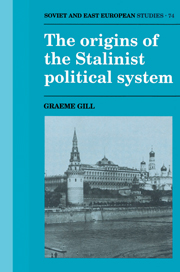Book contents
- Frontmatter
- Contents
- Preface
- Abbreviations
- Introduction: What is Stalinism?
- PART I COHESIVE OLIGARCHY 1917–1922
- PART II THE FRACTURED OLIGARCHY 1922–1929
- Part III THE RE-FORMED OLIGARCHY, 1930–1934
- 5 Regions under pressure
- 6 The Stalinist elite?
- PART IV THE OLIGARCHY SUBDUED, 1935–1941
- Conclusion: Why Stalinism?
- Notes
- Bibliography
- Index
- Soviet and East European Studies
6 - The Stalinist elite?
Published online by Cambridge University Press: 11 September 2009
- Frontmatter
- Contents
- Preface
- Abbreviations
- Introduction: What is Stalinism?
- PART I COHESIVE OLIGARCHY 1917–1922
- PART II THE FRACTURED OLIGARCHY 1922–1929
- Part III THE RE-FORMED OLIGARCHY, 1930–1934
- 5 Regions under pressure
- 6 The Stalinist elite?
- PART IV THE OLIGARCHY SUBDUED, 1935–1941
- Conclusion: Why Stalinism?
- Notes
- Bibliography
- Index
- Soviet and East European Studies
Summary
If the ‘great transformation’ was an important factor reinforcing personalised politics at the sub-national levels, it was also significant in shaping the politics of the elite. The searing nature of the experience of the struggle for collectivisation and industrialisation helped to shape both the institutional contours and the perceptions of political actors at the apex of the structure. New patterns of political action emerged. Conflict was no longer conducted in an open arena but was confined to the closed circles within which the elite moved, and the principles of collectivism were increasingly being subverted by personalised power. These changes were reflected in the changing institutional contours at the top of the political structure.
The institutional arena
The institutional contours of elite politics during this period remained the apex of the party-state structure, although by this time there could be no doubt about the political subordination of the state organs to those of the party. The Congress of Soviets, TsIK and its Presidium played formal and symbolic roles. This was particularly the case with the Congress of Soviets and TsIK, whose meeting schedules and sizes prevented these bodies from operating as meaningful decision-making centres. TsIK and its Presidium did provide the venue for the conduct of bureaucratic conflict between commissariats or similar state bodies, but as organs of decision-making, they were of little importance.
- Type
- Chapter
- Information
- The Origins of the Stalinist Political System , pp. 219 - 256Publisher: Cambridge University PressPrint publication year: 1990



